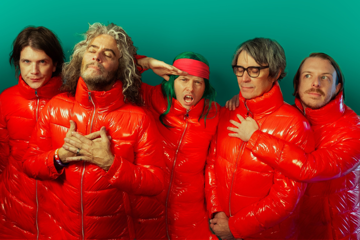"My father cried when he saw the movie, and he never cries ever,” Ruben Alves admits with a smile. It was a potent combination for Alves' parents, for whom he wrote his debut feature, The Gilded Cage, as “a gift”. There was parental pride, the personal significance of the story reflecting their own life, and kitchenware. “When we premiered the film, he said to the audience 'This is my life'. But he seemed just as excited to say 'In the movie, that's really my coffee cup!'”
The Gilded Cage is a crowd-pleasing ensemble piece following a family of Portuguese immigrants in Paris; from the workaholic parents (Rita Blanco, Joaquim de Almeida) to their second-generation kids (Barbara Cabrita, Alex Alves Pereira) to a vast cast of comic caricatures.
“My parents gave me this life,” Alves explains his inspiration. “They left a poor country, and a country under a dictatorship, to come to [France] and work here under bad conditions, working all the time for me and my sister so that we can have a better life. I owe the fact that I'm a filmmaker to them. So, I thought that my first movie should be a homage to them.”
Alves saw a short documentary about a Portuguese concierge who'd spent 35 years living in Paris. “She said, 'A part of me always wants to go back to Portugal, but at the same time I feel so good here in my gilded cage'.” The filmmaker took that as both his title and theme. “This generation of my parents all accepted this treatment, working really hard in bad conditions, because here they had economic freedom and intellectual freedom, two things they didn't have living under a dictator.”
Don't miss a beat with our FREE daily newsletter
In the film's most poignant moment, Pereira pretends Blanco isn't his mother, but the hired help. Alves has never done this (“People I've worked on films with know my mum has the best French fries in Paris!” he laughs), but the scene has struck a chord. “A guy came to see me recently. He said, 'I think I have just lived one of the most important moments in my life when I was in the cinema'. He had brought his mother, and she never goes to see a movie, so it was the first time they'd ever done that. And in that scene, when [Pereira] pretends not to recognise his mother, he said, 'My blood froze, because once I had done that to my mum. But when we were watching it, I felt my mother squeeze my hand, as if to say she'd forgiven me'.”
A break-out box office success in France, but, for Alves, it was just as important how it played in Portugal. Though born and raised in France, the film is a valentine to his heritage. “I've always felt caught between cultures, but I long ago transformed that into a strength, not a problem. It doesn't matter that when I'm in France I feel really Portuguese, and when I'm in Portugal I feel so French. Having this dual identity – this schizophrenia – is a really beautiful thing.”















